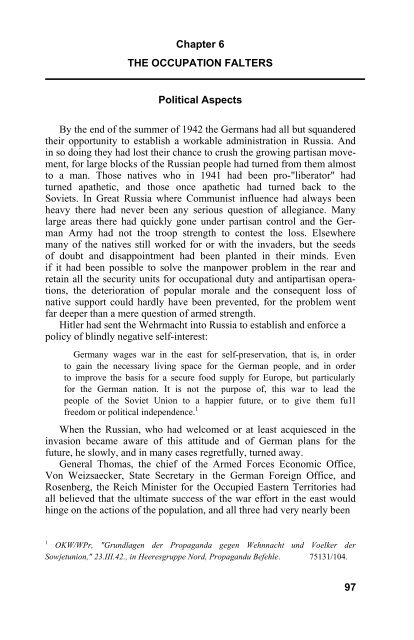the soviet partisan movement 1941-1944 by edgar m. howell
the soviet partisan movement 1941-1944 by edgar m. howell
the soviet partisan movement 1941-1944 by edgar m. howell
Create successful ePaper yourself
Turn your PDF publications into a flip-book with our unique Google optimized e-Paper software.
Chapter 6 <br />
THE OCCUPATION FALTERS <br />
Political Aspects<br />
By <strong>the</strong> end of <strong>the</strong> summer of 1942 <strong>the</strong> Germans had all but squandered<br />
<strong>the</strong>ir opportunity to establish a workable administration in Russia. And<br />
in so doing <strong>the</strong>y had lost <strong>the</strong>ir chance to crush <strong>the</strong> growing <strong>partisan</strong> <strong>movement</strong>,<br />
for large blocks of <strong>the</strong> Russian people had turned from <strong>the</strong>m almost<br />
to a man. Those natives who in <strong>1941</strong> had been pro-"liberator" had<br />
turned apa<strong>the</strong>tic, and those once apa<strong>the</strong>tic had turned back to <strong>the</strong><br />
Soviets. In Great Russia where Communist influence had always been<br />
heavy <strong>the</strong>re had never been any serious question of allegiance. Many<br />
large areas <strong>the</strong>re had quickly gone under <strong>partisan</strong> control and <strong>the</strong> German<br />
Army had not <strong>the</strong> troop strength to contest <strong>the</strong> loss. Elsewhere<br />
many of <strong>the</strong> natives still worked for or with <strong>the</strong> invaders, but <strong>the</strong> seeds<br />
of doubt and disappointment had been planted in <strong>the</strong>ir minds. Even<br />
if it had been possible to solve <strong>the</strong> manpower problem in <strong>the</strong> rear and<br />
retain all <strong>the</strong> security units for occupational duty and anti<strong>partisan</strong> operations,<br />
<strong>the</strong> deterioration of popular morale and <strong>the</strong> consequent loss of<br />
native support could hardly have been prevented, for <strong>the</strong> problem went<br />
far deeper than a mere question of armed strength.<br />
Hitler had sent <strong>the</strong> Wehrmacht into Russia to establish and enforce a<br />
policy of blindly negative self-interest:<br />
Germany wages war in <strong>the</strong> east for self-preservation, that is, in order<br />
to gain <strong>the</strong> necessary living space for <strong>the</strong> German people, and in order<br />
to improve <strong>the</strong> basis for a secure food supply for Europe, but particularly<br />
for <strong>the</strong> German nation. It is not <strong>the</strong> purpose of, this war to lead <strong>the</strong><br />
people of <strong>the</strong> Soviet Union to a happier future, or to give <strong>the</strong>m fu1l<br />
freedom or political independence. 1<br />
When <strong>the</strong> Russian, who had welcomed or at least acquiesced in <strong>the</strong><br />
invasion became aware of this attitude and of German plans for <strong>the</strong><br />
future, he slowly, and in many cases regretfully, turned away.<br />
General Thomas, <strong>the</strong> chief of <strong>the</strong> Armed Forces Economic Office,<br />
Von Weizsaecker, State Secretary in <strong>the</strong> German Foreign Office, and<br />
Rosenberg, <strong>the</strong> Reich Minister for <strong>the</strong> Occupied Eastern Territories had<br />
all believed that <strong>the</strong> ultimate success of <strong>the</strong> war effort in <strong>the</strong> east would<br />
hinge on <strong>the</strong> actions of <strong>the</strong> population, and all three had very nearly been<br />
OKW/WPr, "Grundlagen der Propaganda gegen Wehnnacht und Voelker der<br />
Sowjetunion," 23.III.42., in Heeresgruppe Nord, Propagandu Befehle. 75131/104.<br />
1<br />
97
















